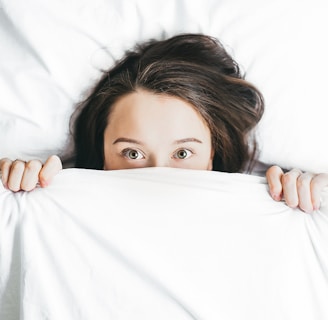Can AI Health Monitors Really Improve Your Sleep?
Smart Tech for Better Nights and Brighter Days
FEATUREDAPRIL 2025KNOW YOUR HEALTH


Photo courtesy of Upslash
Smart Tech for Better Nights and Brighter Days
Without sleep, I'm less. Less sharp. Shorter temper. A whole slew of side-effects crop up that you might expect to read from side of medication bottle. Sleep is the backbone of wellness, but it’s tricky to nail down what’s throwing it off. Enter AI health monitors: tiny, smart devices that track more than just your snores. From air quality to your heart rate, these gadgets promise to decode your sleep struggles and help you wake up refreshed. Let’s explore how AI can turn your bedroom into a sleep sanctuary—and if it’s worth the hype.
Why Sleep Goes Wrong (and How AI Spots It)
Bad sleep isn’t always about too much coffee or your late-night scroll through whatever social media has you ensared, pick your poison, I guess. Let's also look at other factors. Indoor air quality, temperature, even subtle stress can sabotage your rest. The National Sleep Foundation says 35% of adults get less than seven hours a night, and poor environment is often a culprit. Traditional sleep trackers count steps or hours, but AI health monitors go deeper—they learn your patterns and connect the dots.
Take air quality, for starters. Dust or low humidity can clog your airways, leaving you restless. An AI monitor like the Amazon Smart Air Quality Monitor tracks particles, humidity, and VOCs (volatile organic compounds), alerting you when something’s off. Pair it with a wearable—like the Fitbit Sense 2—and you get heart rate, oxygen levels, and sleep stage data, all crunched by AI to spot trends. Maybe that stuffy night was tied to a pollen spike—AI figures it out so you don’t have to. A lot of things can affect sleep, and it's a good idea arm yourself with knowledge, I think.
How AI Turns Data into Better Sleep
Imagine this: You wake up feeling blah, but your AI monitor says last night’s air quality dipped and your deep sleep tanked. It nudges your smart purifier to kick in earlier next time or suggests cracking a window. Devices like Withings Sleep Analyzer slip under your mattress, tracking breathing and movement without a wristband, while their AI flags apnea risks or restless patterns. Over time, they adapt—learning if you sleep better at 68°F or after a humidifier runs. How cool is that!
The payoff? Personalized fixes. If dry air’s the issue, your monitor might pair with a smart humidifier to adjust overnight. If stress is spiking your heart rate, it could cue a calming playlist via Alexa (Billie Eilish anyone?). It’s not just data—it’s a sleep coach that evolves with you.
Does It Actually Work?
Studies say yes—with caveats. A 2024 sleep research paper found smart monitors improved sleep quality by 15-20% for users who acted on the insights. The catch? You’ve got to use the info—ignoring “open a window” won’t cut it. Brands like Fitbit, Withings, and Amazon pack AI into sleek, easy-to-use designs, but they shine brightest when paired with other smart gear. Think of it as a wellness team: monitor flags the problem, purifier fixes the air, you sleep like a baby. The 21st century deserves better air, right?
Ready to Sleep Smarter?
Start small: place an AI monitor in your bedroom and track a week. Look for models with app insights—Fitbit Sense 2 for wearables, Amazon Smart Air Quality Monitor for air, or Withings Sleep Analyzer for no-fuss setup. We’ll break down the best picks in a future guide, so stay tuned. For now, try a simple tweak—move that dusty plant out of your sleep zone—and let AI do the rest.
Here at AIHomeWellness.com, we’re obsessed with smarter living. Next up: pairing air purifiers with health monitors for the ultimate wellness win.
Sleep tight,
The AIHomeWellness Team